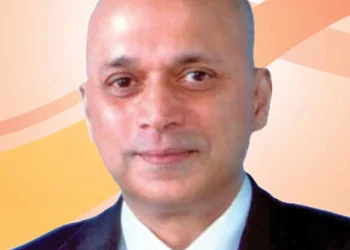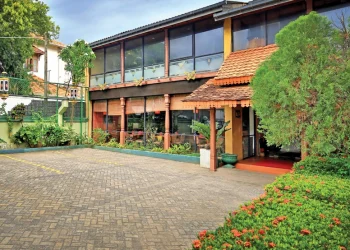
People’s Leasing & Finance (PLC) has over the years gained a reputation as a strong and efficient financial institution, backed by the security of the state sector. Catering mainly to the SME sector and lower-middle segments of the Sri Lankan economy, PLC is driven by a mission to enable greater financial inclusion in the country. Since being appointed to the helm of the organisation in July 2017, A S Ibrahim, CEO and General Manager, PLC, who brings with him 33 years of experience in the banking and financial sector says PLC’s future strategies will aim at further enhancing their core strengths.
By Udeshi Amarasinghe and Keshini de Silva
Photography Mahesh Bandara and Menaka Aravinda
Could you tell us about the performance of People’s Leasing & Finance, since you assumed responsibilities at the helm?
Despite a difficult operating and economic environment, PLC achieved the main Key Performance Indicators (KPIs) that it set for itself. Overall we had a satisfactory year, although not an excellent year.
Our subsidiary in Bangladesh, Lankan Alliance Finance, finally began operations in January. We are confident that it will break even in the first year of its operations and begin contributing to the PLC Group in a short time.
A few days back we issued debentures for six billion rupees and the issue was oversubscribed within a few hours. Very recently, PLC was also recognised, by Brand Finance, as the most valuable brand in the NBFI sector. These achievements bear testimony to the trust the Company has earned among the public in general and the financial market in particular.
In general, the performance of the entire industry has been rather subdued because of the tighter Loan-to-Value (LTV) rules. In addition, the overall economic performance of the country has also been affected due to drought, floods, balance of payment problems and some measure of political instability in the country.
What are the key segments that PLC caters to?
PLC largely caters to the SME sector of Sri Lanka as well as the lower-middle market range of customers. These are usually customers who do not have easy access to bank financing.
Our mission is to enable financial inclusion in the Sri Lankan economy. Those who cannot obtain facilities from a bank, will be catered to at PLC, where we provide finances for their businesses, asset acquisitions, consumption and personal needs. We have developed a range of products to cater to their varied needs. People Leasing & Finance is here to cater to the part of the economy that is, thus far considered non bankable.
What about the future direction and strategies of PLC?
In terms of the future, our focus will be on PLC’s core business, which is leasing and loans. We will be adding new products as we go along. Some new products were introduced in the latter part of last year and we will be adding a few more to our portfolio this year. We intend to focus on the basics.
PLC Is A Purely Service Driven Organisation. Our Strength Over The Decades Has Been Our Staff And This Is What Has Propelled Us To Our Current Position. Therefore, We Continue To Employ The Best, Groom Them, Train Them And Retain Them.
We will also be concentrating on developing and training our staff. We want to strengthen and empower our human resources base. We will also be leveraging on IT to its optimum potential, as we are conscience of our need to reduce costs. We have grown exponentially over the past few years; presently we have 103 branches, and this year we will probably add two more branches to our network. Currently our focus is on consolidating our position.
We want to reach out to more customers and become faster, cheaper and better in everything we do.
Could you elaborate on the new products introduced? How are they faring in the market?
The products are still in the introductory phase. One of our new products is an Islamic Financing product. We have also introduced gold loans. However, we are introducing these new products in a measured manner; they have not been spread across the network as yet. We have introduced the products in a few branches, which we hope to grow as we progress. If we identify increasing demand for the product, then we will expand the offering. At present, it is at an introductory stage.
How does PLC cater to balance its services in terms of catering to a diverse customer base?
We do that by building strong relationships with our customers. This is the reason we have built a large branch network. Since these customers do not maintain formal financial statements, we need to cultivate a close relationship with the customer to truly understand their business, their aspirations, the risks involved and to comprehend what products can be offered and whether we can manage the relationship going forward.
What sets PLC apart?
Our speed, efficiency and knowledge of the market. On the deposit side, we are supported by People’s Bank. 75 per cent of PLC is owned by Peoples’ Bank. Therefore, whilst providing an outstanding service, we offer the security of a state institution.
Staff have been the core strength of PLC. Could you elaborate on this?
PLC is a purely service driven organisation. Our strength over the decades has been our staff and this is what has propelled us to our current position. Therefore, we continue to employ the best, groom them, train them and retain them. We structure our training in both technical aspects and soft skills to ensure that our business is going forward and will grow in a sustainable way. As we go along, this will continue to be one of our key focuses.
What about the transition in terms of being appointed to the helm of PLC?
My predecessor set very high standards. Maintaining these standards is our biggest challenge. But we are backed by an excellent team. He has built a very strong base, and though it has been tough, we are getting there.
What more can be done in the industry?
Obviously, one of the things that we could do is to increase our product range to cater to more customers. That is the type of inclusion that we seek. Different customers have different needs, and at the moment the industry is only catering to some of them.
The financial industry needs to broaden its footprint in terms of capturing customers, introducing more products and becoming more efficient.
In the present, how can the industry rebound?
Political stability is paramount. Not merely for our industry, but for the entire financial industry. With political stability there will be economic growth and a lack of volatility. For example, interest rates have been fairly volatile, although there is some kind of stability now.
We need a stable economic environment, underpinned by political stability. With this stability comes predictability which is crucial for investors. If on the other hand there is a high degree of volatility, investors are not going to come and big projects will not take off. When there is no growth, our customers are affected and the entire industry is affected. This is crucial; everyone should join together and think about the betterment of the country.
SMEs are the most vulnerable to this predicament. Blue chips and large corporates have the strength and muscle to ride out a few turbulent periods. However, the SME sector does not have that kind of cushion. If you have a short bad period, they may topple. Many of our customers have been affected and their repayment capacity has been affected as well.





